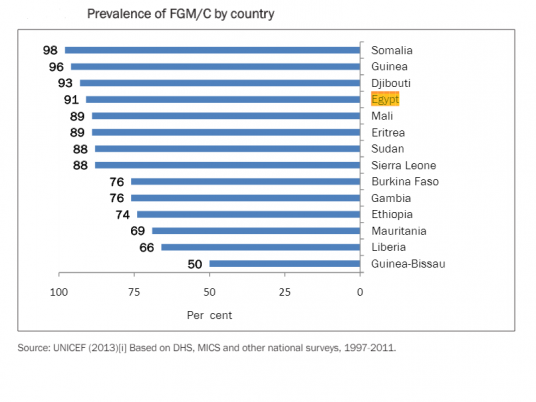
According to the Egypt Demographic Health Survey of 2014, awareness against the practice of female genital mutilation (FGM) has slightly improved among the new generations, one of the severe societal challenges facing the nation.
The survey reveals that despite the high occurence (over 90 percent) of FGM in the overall population of women ever married (aged 15 to 49 years), the occurence has declined by 13 percent since the 2008 survey in the population of girls aged 15 to 17 years old, reaching 61 percent.
The modest decline over a period of six years could be a sign that government- and community-based awareness efforts against the now-outlawed practice are beginning to reap rewards.
Among those working for change are the FGM Abandonment and Family Empowerment Program, which is implemented by the State for Population Ministry, aiming to highlight the risks of the harmful practice.
The new survey also demonstrates that mothers are increasingly abandoning the practice of FGM compared to the figures and statements of previous surveys.
Egyptian mothers indicated their support for the practice declined from 75 percent in 2000 to 58 percent in the 2014 survey. Subsequently, the expected percentage of circumcised women and girls aged 0 to 19 years reached 10-11 percent in urban areas and lower Egypt, including Damietta and Port Said. This is also expected to be applied in Upper Egypt as the survey points out “noticeable improvement of the indicators” in some governorates over there.
State for Population Minister Hala Youssef points out that among the factors that attributed to the decline of FGM is the enforcement of the law banning the practice and criminalization of doctors who perform it.
“The data analysis pertaining to girls in the age group (15-17 years) reflects the efforts of media campaigns and on the ground community initiatives, in addition to law enforcement efforts, as we have seen in the latest sentencing regarding Suhair al-Batei’s case ― who died while undergoing FGM by physician, which resulted in a two-year jail sentence for the doctor and the reprimanding of the father for three months with a suspended sentence,” Youssef added.
The case of circumcised 13-year-old Batei from Daqahalia was one of the cases that drew much attention. In June 2013, the teenager passed away due to complications that resulted from an illegal FGM operation.
“The large number that exceeds 90 percent of mothers does not bother me much, as the figure represents a sample of women who were born in the mid-seventies and eighties in the age group (35-49 years) and this age group will continue to be represented in the upcoming surveys for many years, but what bothers me most is that more than 80 percent of FGM cases are carried out by health service providers, despite the fact that the FGM practice is a clear violation of the ‘Ethical and Professional Charter for Physicians’.”
Despite the ban, circumcision is still carried out on a large scale under the name of “tradition” to marginalized girls and women living in the underprivileged areas across the country where health care facilities suffer from deplorable conditions.
According to AFP, FGM is practiced among minority Christians as well as Muslims. The practice involves the removal of the clitoris and, sometimes, even more extreme mutilation in a bid to control women's sexuality.
